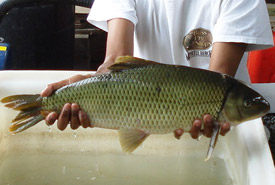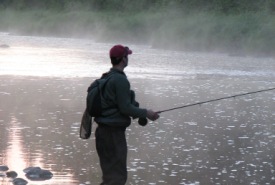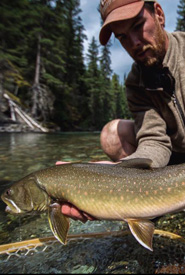Keeping fish at bay

Copper redhorse (Photo by NCC)
I will admit that it sure is satisfying interacting with something wild and alive outdoors. I don’t think I would have made it this far as a human if I were born in Australia or the Southern U.S., since I have been pricked, stung and bitten by just about all the critters you can think of in western Canada.
I seem to remember being nipped by a toad as a young child, but my childhood memories and dreams are increasingly melding together into the same thing. Being close to nature is the reason why I fish; it connects me with this squirming timid creature that you otherwise wouldn’t know existed if you just wandered by the rivers and lakes in Alberta.
To me, fly fishing is such a wonderful sport because it brings me to the most beautiful places in the world, and I can’t wait to leave civilization behind and just catch some fish. To tell you the truth, it’s not until I have a fish in the net, cradling its underbelly, that I see the beauty and power of wilderness.

Man fishing in New Brunswick (Photo by NCC)
With more and more people heading outdoors to cast a line, learning proper fish-handling skills can literally be the difference between life and death for the fish. I recently read a paper where biologists measured the air exposure time that anglers put fish through during handling, si as to not alter the behaviour of their test subjects (although, I quite enjoy the mental image of a biologist in camouflage observing fishermen from a distance).
Before I outline their findings of the 280 fishermen observed, I would like to note that it’s generally understood that air exposure is harmful to fish and can be considered sub-lethal or lethal depending on the total exposure time.
They found that the average total air exposure time was 22.2 seconds for fly-fisherman, with the longest time being 160 seconds. For perspective, one study cited found that mortality was less than three per cent for air exposures of 128 seconds and nine per cent for 300 seconds, which seems pretty good for the men and women of Idaho and Oregon, where the study was done.
The problem is that studies vary and it seems there is no solid air exposure threshold that we shouldn’t cross. I will admit, it’s tempting to anthropomorphize the situation: "How would you feel running for your life from something trying to eat you and then holding your breath for 30 seconds?" I will conclude on my false logic that no airtime is best practice. It can’t hurt.
Once, while floating down a cutthroat river that I frequent, I saw another boat pull over just downstream. Rod bent double, guide frantic in his search for the net...I knew they had a decent fish on the line. Finally, they reached the bank and the guide instructed his lucky guest to get on shore and pull the fish into calmer water. I then witnessed “Mr. Lucky” drag a 30-inch bull trout onto the rocks so that the guide could grab it and put it in the net, after the battle left the fish with a few bumps on its head from nearby rocks visible from where I stood.
I would argue that the most important aspect of fish handling is the actual handling itself. A fish should never be beached; in other words, don’t drag the fish onto the shore if you don’t have a net. If it can’t be pulled up without beaching, then cut the line. Once you have the fish in hand, cut the fly off if the hook is deeply set or in a spot that will likely bleed. Finally, be conscious of air exposure when snapping a picture. The objective of catch and release is to offset mortality, unless you plan on eating your catch.
Just the other day, I hooked a hefty rainbow trout on a small mountain creek near where I live. In a flash, it ran downstream, behind my legs and into a thick ramble of submerged twigs and sticks to my right. Failing to pull it out in time, the fish tangled my line into oblivion while hanging itself up in the process. Reaching down, I got within inches of it and cut the line, instantly freeing the fish. Gazing up-river and reflecting on my failure to land one of the feistiest rainbows of the year, I had to remind myself that it’s just great to be outside.


